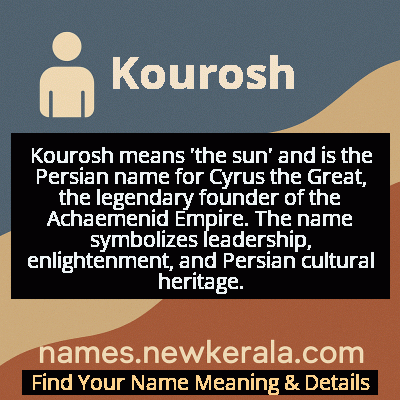Kourosh Name Meaning & Details
Origin, Popularity, Numerology Analysis & Name Meaning of Kourosh
Discover the origin, meaning, and cultural significance of the name KOUROSH. Delve into its historical roots and explore the lasting impact it has had on communities and traditions.
Name
Kourosh
Gender
Male
Origin
Persian
Lucky Number
8
Meaning of the Name - Kourosh
Kourosh means 'the sun' and is the Persian name for Cyrus the Great, the legendary founder of the Achaemenid Empire. The name symbolizes leadership, enlightenment, and Persian cultural heritage.
Kourosh - Complete Numerology Analysis
Your Numerology Number
Based on Pythagorean Numerology System
Ruling Planet
Saturn
Positive Nature
Ambitious, efficient, realistic, and authoritative.
Negative Traits
Materialistic, stressed, confrontational, and can be overly ambitious.
Lucky Colours
Dark blue, black.
Lucky Days
Saturday.
Lucky Stones
Blue sapphire, amethyst.
Harmony Numbers
2, 4, 6.
Best Suited Professions
Business leaders, managers, financial services, law enforcement.
What People Like About You
Leadership, determination, organizational skills.
Famous People Named Kourosh
Kourosh (Cyrus) the Great
Ancient Persian Emperor
Founded the Achaemenid Empire and created the Cyrus Cylinder
Kourosh Yaghmaei
Musician
Pioneer of Iranian rock music and influential psychedelic rock artist
Kourosh Zolani
Film Director
Award-winning Iranian filmmaker known for social commentary
Kourosh Kiani
Academic Historian
Renowned scholar of ancient Persian history and Achaemenid studies
Name Variations & International Equivalents
Click on blue names to explore their detailed meanings. Gray names with will be available soon.
Cultural & Historical Significance
In modern Iran, Kourosh represents national pride and cultural heritage, symbolizing the golden age of Persian civilization when the empire stretched from the Mediterranean to Central Asia. The name carries the weight of historical legacy, reminding Iranians of their ancestors' contributions to human civilization through architecture, administration, and cultural achievements. Kourosh remains a touchstone for Persian identity, connecting contemporary Iranians to their ancient roots and serving as a symbol of leadership, wisdom, and cultural sophistication that continues to inspire generations.
Extended Personality Analysis
Individuals named Kourosh are often perceived as possessing leadership qualities, confidence, and a commanding presence, reflecting the name's royal heritage. They tend to exhibit strategic thinking, ambition, and a natural ability to inspire others, much like their namesake emperor who united diverse peoples under his rule. Kourosh typically demonstrates intellectual curiosity, cultural awareness, and a strong sense of justice, often showing concern for fairness and ethical conduct in their personal and professional relationships.
Many bearing this name display a blend of traditional values with modern perspectives, maintaining respect for heritage while embracing contemporary ideas. They often possess a dignified demeanor, emotional resilience, and the ability to handle responsibility with grace, making them natural leaders in various fields from business to academia to creative pursuits. The name seems to carry an expectation of excellence and integrity, with many Kouroshes developing a keen sense of cultural identity and historical awareness that informs their worldview and personal philosophy.
Modern Usage & Popularity
Kourosh remains a popular and respected name in Iran and among Persian diaspora communities worldwide, though its usage has evolved with changing times. While traditionally common among older generations, it has seen a resurgence among educated, middle-class families who value cultural heritage and historical significance. The name maintains steady popularity without becoming overly common, preserving its distinctive character. Among Iranian immigrants in Western countries, many choose the name Kourosh to maintain cultural connections while sometimes using Cyrus as the practical, everyday version. The name is particularly favored by families with strong interest in Persian history and those seeking to instill a sense of cultural pride and leadership qualities in their sons. Recent years have shown increased usage among younger parents rediscovering traditional Persian names with deep historical roots, ensuring the name's continued relevance in contemporary society.
Symbolic & Spiritual Meanings
Symbolically, Kourosh represents illumination, leadership, and cultural legacy, drawing from both its literal meaning as 'the sun' and its association with Cyrus the Great. The name embodies the concept of enlightenment—both in the sense of bringing light and knowledge, and in the philosophical sense of wise governance and ethical leadership. It symbolizes the bridge between ancient glory and contemporary identity, serving as a living connection to Persia's imperial past while adapting to modern contexts. Kourosh carries connotations of unity in diversity, reflecting Cyrus's ability to govern a multicultural empire while respecting different traditions. The name also represents resilience and endurance, mirroring the lasting impact of Persian civilization through centuries of historical changes. As a symbolic entity, Kourosh stands for the ideal balance between strength and compassion, authority and tolerance—qualities that made its most famous bearer one of history's most admired rulers.

